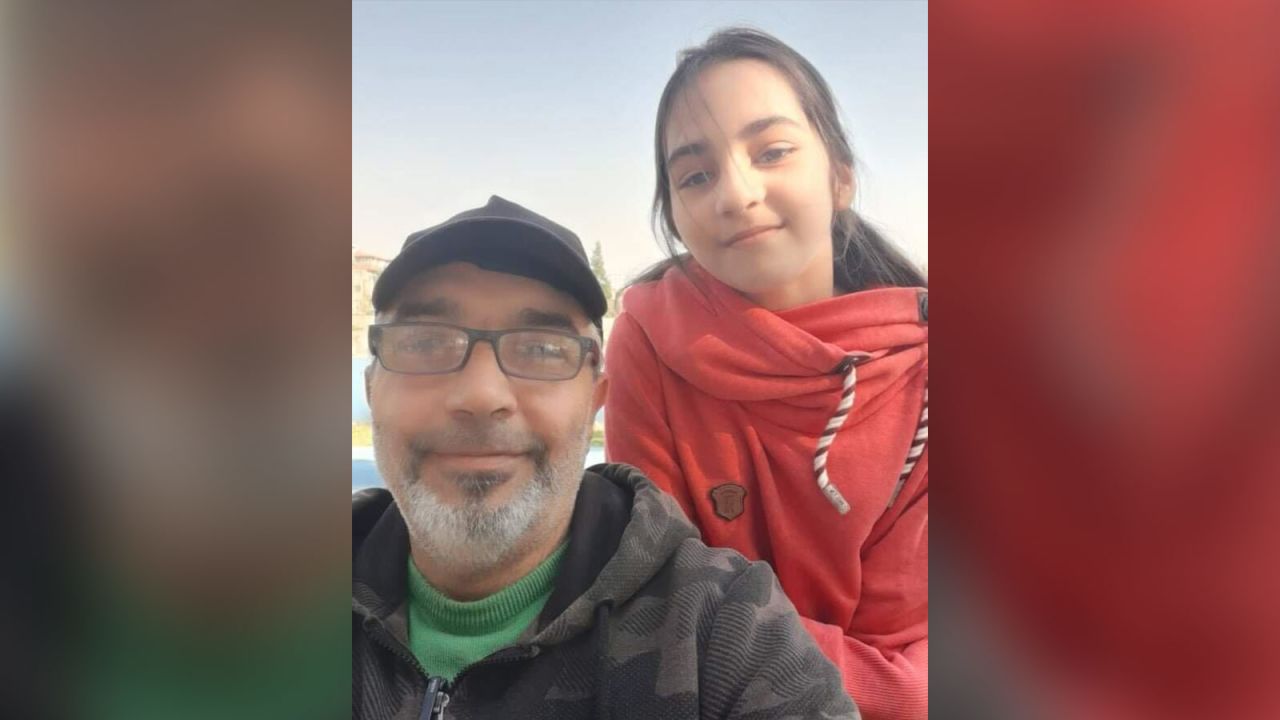"They built a cemetery," Turkey earthquake survivor says of collapsed buildings 3:01
Abu Dhabi, UAE (CNN) --
"She used to jump like a butterfly. Now she's psychologically wrecked."
Samer Sharif, 51, talks about his 15-year-old daughter Salma, who witnessed the death of her brother and mother in the earthquake on February 6, and for several days believed she was orphaned before being unexpectedly reunited with his father.
Following the earthquake, Sharif received the news that Salma, her 10-year-old brother Mohammed, and his ex-wife had died.
CNN visits an orphanage in Turkey: this is how the earthquake impacted the children
Standing in front of the building that collapsed on his family, in Antakya, southern Turkey, Sharif said he "met death at that moment."
"There is nothing left in Antakya. Everything has disappeared," he told CNN.
After sleeping on the streets for two days, Sharif went to Istanbul, where she stayed with her sister and her husband.
advertising
There he received good news: his daughter was alive and was recovering in the hospital.
Earthquake survivors Samer Sharif, 51, and his daughter Salma, 15, are pictured together.
Courtesy of Samer Sharif
Father and daughter were reunited and although they were relieved, they will never be the same again, especially Salma.
And Salma is not the only one.
Some 4.6 million children lived in the 10 Turkish provinces affected by the quake, according to UNICEF, and another 2.5 million children were affected in neighboring Syria.
UNICEF added that families with children are sleeping in the streets, shopping centers, schools, mosques, bus stations and under bridges, all afraid to sleep indoors in case more aftershocks collapse the buildings.
"I saw many traumatized children in Antakya," said Bilal Kazak, 37, a Kazakhstan-born Turkish citizen who lost his mother and sister in the quake.
Although food, tents and caravans with some heating have arrived in the days after the earthquake, Kazak says, there is still not enough mental health support, especially for children.
Speaking to CNN's Zain Asher, Oben Coban, a spokesman for the aid organization Save the Children in Turkey, said victims show clear signs of post-traumatic stress disorder (PTSD), especially children, many of whom have left without parents
"What we also see is that these children who have lost their education, their families, their hopes, are now struggling to find a reason to stay in this world," Coban said.
"Right now, the only thing that can keep them going in their lives is hope for the future."
Earthquake in Turkey leaves at least 6 dead after aftershocks of magnitude 6.4 and 5.8
Relived trauma in Syria
For the victims of Syria, the earthquake is another crisis in the midst of a devastating 12-year civil war.
Children and families recovering from post-traumatic stress disorder and ongoing trauma from the scars of war are back in survival mode, Dr. Alexandra Chen, a trauma psychologist who treats children, told CNN. earthquake victims.
"For people who have slowly begun to recover and regain a sense of normalcy and rebuild their lives over the past decade, this has been frightening and destabilizing for both children and adults," Chen said.
"Some continue to deny it, while others experience hallucinations."
"When the roof fell, my heart froze": the story of a 75-year-old survivor of the earthquake in Syria that left her homeless
The UN estimates that more than 30,000 lives have been lost in the Syrian civil war.
People were already struggling to rebuild their lives, while thousands fled the country seeking refuge in nearby countries.
Although a kind of routine had been established before, Chen says that the situation has changed.
"Before the earthquake, therapy was not emergency-based, and we had the time and space to process very difficult things, especially for those who have suffered torture and sexual violence," he said, adding that "we are back in mode of emergency".
Chen says aid workers are also having a hard time.
Between losing his own family and homes, and rescuing people from the rubble, his mental health has deteriorated amid ongoing rescue efforts, he said.
Aid workers say the mental health problems are evident and come amid the need for more food and shelter.
recurring aftershocks
To make matters worse, the risks of new tremors have not disappeared.
"A lot of people aren't comfortable living inside (intact buildings)," says Arlan Fuller, director of Emergency Preparedness and Response for Project Hope, a US-based nonprofit, nongovernmental organization that supports healthcare workers in Crisis times.
Fuller and Project Hope are currently on the ground in Gaziantep.
"I've heard and seen a lot of situations where people don't want to go back inside," Fuller told CNN, "Or when they're inside, they're constantly focused on the ceiling light, waiting for it to move."
Against all odds, they continue to rescue survivors after the earthquake in Turkey and Syria
Many children cling to their parents and cannot let go, he added, noting that repeated aftershocks no longer trigger their symptoms.
Aftershocks continue to be felt across Turkey.
Just on Monday, a magnitude 6.3 aftershock struck the southern Turkish province of Hatay, near the Syrian border, killing at least six people and injuring hundreds.
The Turkish Red Cross reported that it is providing "psychological first aid" to both adults and minors affected by the quake, the state-run Anadolu news agency reported.
This includes therapy sessions as well as psychosocial support tents set up by the Family Ministry and the Health Ministry, Anadolu added.
Salma, 15, is still distraught.
She spends most of her time on the phone and refuses to eat well, says her father, Samer.
"He wants to buy those little toy cars that Hammoudeh (his brother Mohammed's nickname) liked so much to put them on his shelf, look at them and remember him," Sharif explains.
"I keep trying to make her laugh, but it's not like before."
Earthquake in SyriaEarthquake in Turkey

